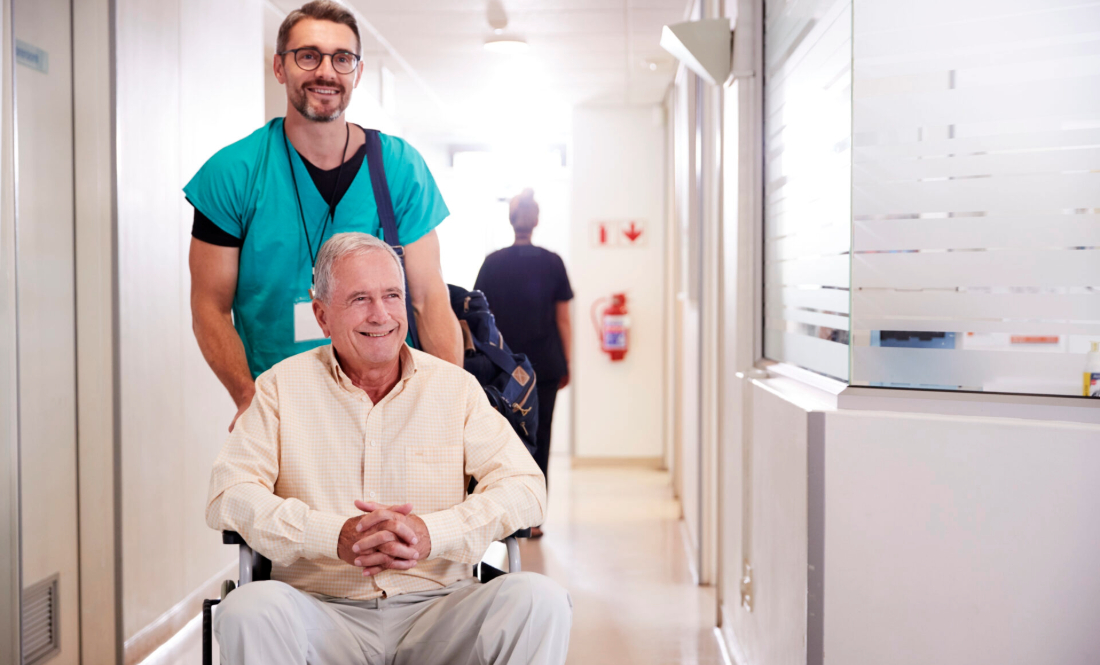How Home Care Helps Your Loved One Avoid a Hospital Readmission

Author: Home Helpers Home Care
Five Ways In-Home Care Helps Avoid a Hospital Readmission After Discharge
According to the Centers for Medicare and Medicaid Services (CMS), one out of every five patients who are discharged from a hospital is readmitted within 30 days. Hospital readmissions are costly – reaching as high as $26 billion every year – and, more importantly, can put the patient at risk for further complications.
While hospitals have traditionally served as the focal point for reducing a hospital readmission for patients, many health care services along the care continuum can do their part. In-home care offers a wide range of services that can help patients recover after being discharged from the hospital, including care and companionship, wellness calls, safety and 24-hour monitoring, and nutrition and well-being.
How Home Care Reduces Hospital Readmissions
Here are five ways in-home care can help reduce the chance of a hospital readmission for your loved one:
- MEDICATION COMPLIANCE – After being discharged from the hospital, the doctor may prescribe medication to help with recovery. It’s always good to follow the doctor’s directions when taking a prescription, but it’s essential when recovering from a recent hospital stay. Consistently taking the accurate dosage at the right time is the best way to ensure the medication works correctly, and it’s also the best way to protect against adverse side effects, including preventable illness, readmission to the hospital, and even death. Home Helpers® Home Care offers a wide range of services to assist with medication reminders, prescription pick up, and meal preparation for medications that need to be taken with food.
- NUTRITION AND HYDRATION – Proper hydration is especially important if you are recovering from an injury. In addition to reducing inflammation and swelling, it increases blood flow and delivery of nutrients to the injured area, and helps to eliminate waste products from the body. According to the U.S. National Academies of Sciences, Engineering, and Medicine, an adequate amount of fluid intake is about 15.6 cups (3.7 liters) daily for men and about 11.4 cups (2.7 liters) of fluids for women.
Additionally, your doctor may put you on a special diet to help you recover. Whatever your nutritional needs are, our Caregivers can help plan, shop, cook, and serve a menu that meets and maintains your dietary requirements.
- IN-HOME ASSESSMENTS – An in-home assessment before or immediately following a hospital discharge can reduce the risk of falls once the patient comes home. Our free in-home care assessment is a no-obligation consultation in which our team will assess your home environment and recommend what you can do to make your home safer. It also allows you and your family to ask questions about home care to determine if it may be the right fit to help support your loved one’s recovery and ongoing care needs.
- REAL-TIME MONITORING AND FALL DETECTION – Hospitalization in older adults, including those who are admitted for medical problems, rehabilitation, and acute care, is associated with a decline in function and mobility – creating a higher risk of slip-and-fall accidents.
Advances in personal emergency response systems (PERS), such as Direct Link® powered by Aloe Care, have been a game changer for the in-home care industry.
According to a study by Connect America, there was a significant reduction in readmissions, emergency department visits, and overall hospitalization costs, including:
• 68% decrease in 90-day readmissions
• 53% decrease in 180-day readmissions
• 49% decrease in EMS encounters
• 31% decrease in hospitalization costs.
Direct Link® powered by Aloe Care offers wearable and voice-activated devices that are equipped with automatic fall detection. If a fall is detected and the users do not cancel the notification, that person’s emergency contact will be notified instantly, allowing them to get the care they need as quickly as possible.
Additionally, Direct Link® powered by Aloe Care includes a secure app that allows family to check-in on loved ones through the speakerphone on the Smart Hub in the home, assess real-time updates, and collaborate on care while a Caregiver is in the home.
- FOLLOW-UP APPOINTMENTS – Whether your hospital stay was due to a scheduled surgery or an emergency, having a plan for when you are discharged is critical to prevent avoidable readmissions. Oftentimes, follow-up visits to physicians and other care professionals are necessary to ensure compliance to the discharge care plan. Our Caregivers are available to provide transportation to and from follow-up appointments, as well as advocate for the client during the appointment and report back to family.
Home Helpers® Home Care is here to help our clients recover safely in the comfort of their homes and avoid a hospital readmission wherever they call home.
We are here to be your trusted partner in your discharge journey, with a team of compassionate professionals supporting you every step of the way. Through collaborative, comprehensive care, we intend to help reduce preventable readmissions and hospitalizations. Our care services are customized to meet our client’s unique needs and requirements.
TO LEARN MORE ABOUT OUR SERVICES, CONTACT US TO SCHEDULE YOUR FREE IN-HOME CARE ASSESSMENT OR FIND AN AGENCY NEAR YOU.
